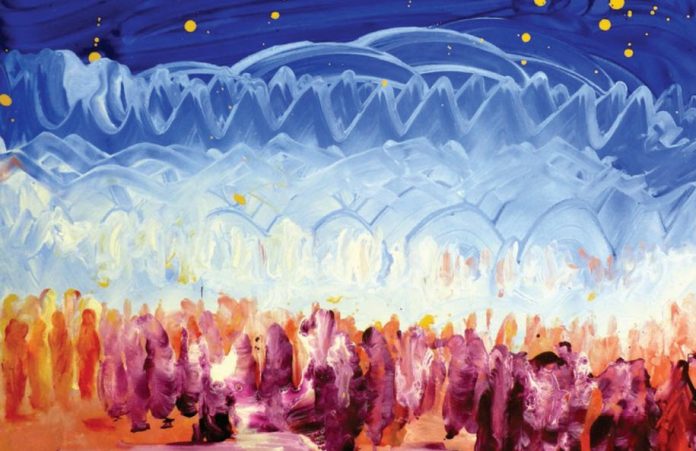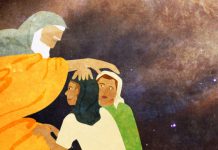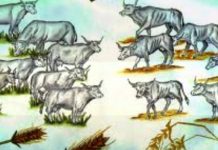Moses Reviews the Desert Experience
The boy was deathly ill. His father, the king, took him in the royal carriage to his doctor who lived in a far-off land. “We must get him to the doctor before he dies in our embrace,” proclaimed the king. When the carriage was of no use, they continued on foot. Then he carried his son on his shoulders until they arrived at a resting place. The father attended to every need of his ailing son. He climbed the high trees to bring him fresh fruit, and drew water from every well they came upon.
At last they reached their destination. The doctor prescribed medicine and rest. The king nursed his son back to health for many weeks. At last they were ready for the long journey home. As they traveled, this time on horseback, the king kept pointing out to his son all of their past experiences. “Here was our camp, you can see the fireplace. Here you had a high fever and had to rest. Here you can even see our footprints.”
The son took great interest in the signs of their vaguely remembered trip. He had great appreciation for the love his father had shown. However, as he examined the footprints, there seemed to be something wrong.
“Father!” he exclaimed, “At this point I see both of our footsteps, but later on I only see yours. Why did you abandon me when I was ill?”
His father, the king, with tears streaming down his face, explained to his beloved son: “That was when you couldn’t walk and I carried you on my shoulders!”
THE BOOK OF DEUTERONOMY
This last book of the Torah is unique in many ways. It is written mostly in the second person, with Moses speaking to the people. In fact the sages themselves call Deuteronomy “the words of Moses!”
Question: Don’t we believe that God dictated the entire Torah word-for-word to Moses? Don’t the sages say that one who claims that Moses wrote one word, or even one letter on his own, has denied the Divinity of the Torah?
Answer: The Malbim explains that the Book of Deuteronomy consists mainly of Moses’s lectures and admonitions to the people, as the first verse clearly states: “These are the words of Moses to the people.” Yes, these were words of a holy prophet, but this did not make the words “Torah” for all generations. God then commanded Moses to repeat his words again, before his death, and to write them down exactly as God dictated. Now that they were dictated by God, they became part of the eternal “Torah,” the word of God!
The Book of Deuteronomy has 3 parts:
- The first segment is a history lesson. Moses reviews past events, shedding light for the benefit of the new generation that did not experience them.
- The end of the lawgiving process. Moses finishes transmitting the 613 mitzvot he received at Sinai, stressing those mitzvot that specifically apply to those entering the Land of Israel.
- The final farewell of Moses before his death, enjoining the people to fulfill the Torah, appointing heaven and earth as “witnesses,” and warning of the national consequences of forsaking God’s Torah.
HISTORY LESSON
Everyone understands the importance of math, English and science. It is only the study of history that people ask, “Why is this important to learn!?” What difference does it make to me that there was an emperor of China 500 years ago who had a big belly, 20 wives, and the name Choo Chung Ching?? The standard reply is: “History repeats itself! Those who do not learn from the past are destined to repeat it!” In order to understand current events, one must have an appreciation of recent and even ancient history as background.
Jewish history is, of course, a different story.
The story of the Jewish people is the story of the relationship with the Almighty. It literally defies all natural explanations. (A number of historians became anti-Semites after determining that every pattern in history is messed up by the Jews.) Imagine an alien from another planet beaming down to planet Earth and doing a study of all human history – excluding the Jews. He would then formulate principles that reflect certain patterns. Such as the rise and fall of the Roman, Greek, Persian civilizations, the fall of Communist Russia, etc. Upon examining the Jews, what would he find? They break every rule! By any principle of “cause and effect,” we should have lost our identity long ago.
When Louis XIV demanded a clear proof of God, the reply from the great philosopher Blaise Pascal was: “The Jews, your highness. The Jews!”
THE REBUKE OF MOSES
The opening verses of our Parsha tell us that Moses spoke to the people on the other side of the Jordan, in the desert, on the plains, opposite Suf, between Paran and Tofel and Dizahav (Deut. 1:2).
Question: Why is it necessary to inform us of the exact location of Moses’ talks, including latitude and longitude?
Answer: Since this is our final encounter with Moses (the entire Book of Deuteronomy was right before his death) and his grave is unknown, the Torah tells us the exact location, so if we find the spot it will be a reminder of our great teacher and leader. (Rabbi S.R. Hirsch)
Rashi, the classic commentary, however, points out that these places are not mentioned anywhere else. He concludes that these are not real names, but rather words that symbolically hint to the various errors the people had committed during the 40 years, from the Golden Calf to the spies to the complainers.
The best time to rebuke one’s children or followers is on the deathbed. That is the time that people are most receptive to hearing rebuke, and least likely to resent it. So we find by Jacob, Joshua, Samuel and David.
LIKE THE STARS
Moses compared the Jewish people to the stars, although they were not so numerous at the time. The Jews are also compared to the sand, both of which are too numerous to count. The difference between them is that sand is downtrodden, stepped on by all. This is symbolic of Jewish exile when times are difficult. On the positive side, the grains of sand all stick together and are able to hold back the mighty waves of the sea.
On the other hand, stars are up in the sky. They symbolize when the Jews are on top and have it well. On the negative side, stars are light years away from each other; when things are going well, we Jews often fight among ourselves.
The story goes that when they rescued Mendel from the desert island after 10 lonely years, he gave them a guided tour of his island. “Here’s where I store my food, and here’s my eating place. This is my stable and bedroom. And these are my two synagogues.”
Immediately his rescuers inquired, “Why does one Jew need two synagogues?”
Replied Mendel, “Very simple. This is the one I pray in, and the other one I don’t – and frankly would not be found dead in!”
FIRST SANHEDRIN
Moses relates how he appointed the first Sanhedrin (supreme court) to the great joy of the nation. The commentaries explain that Moses was hinting to them that their joy might not have been sincere. Rather they were happy over the fact that they now could access the judge, who could be their friend and might accept a bribe to judge in their favor. This was much better then the old school of Moses that was incorruptible.
SIN OF THE SPIES
Moses stresses the people’s role in this colossal mistake. The people originally requested the spies, refused all appeals by Moses, and finally refused to enter the land. They complained in their tents about how much God hated them, so the response of God was: “They cried for no reason, now I will give them a good reason to cry.”
This night became a night of pain and sorrow for all generations. Yet this was also the secret of the survival of the Jewish people. Because we suffered so much, we constantly repented and never reached tdecadent levels of other nations that typically leads to societal decay.
ALL YOUR FAULT
Finally Moses blames the people for God getting angry with him, the result being that Moses could not enter the land.
Question: Isn’t that just “passing the buck” and not recognizing his own guilt?
Answer: Moses was not denying his fault; he was only enumerating the results of the people’s sin of the spies. Had they not sinned, Moses would have entered the land and the “days of Messiah” would have arrived. The Holy Temple would have been built by Moses and could never have been destroyed. As a result of the 40 years of wandering, the entire course of Jewish history changed.
SICHON AND OG
These two giant kings collected “protection money” from all the Canaanite monarchs to guard them from the Israelites. Moses had the chutzpah to request “free passage” through their land. Instead of having to siege the tremendously fortified city of Cheshbon (that the Rabbis say would have been difficult to conquer had it only been full of mosquitoes), God made the Canaanites self-confident. They went out of the city to fight the Jews, lost the battle, and the Jews were able to enter the city unchallenged.
God tells Moses (both in Numbers 21:34 and Deut. 3:2) that he should not fear Og.
Question: Why would Moses fear Og more then Sichon or any other king?
Answer: Og had a special merit. The Torah (Genesis 14:13) tells us that after the first recorded war in history – the battle of 4 kings against 5, the real World War One – the “survivor” informed Abraham that his nephew Lot was captured. The sages say the “survivor” was none other then Og, who not only survived the war, but was known as the survivor previously because he actually survived Noah’s Flood by grabbing onto the outside of the Ark. The fact that Og did a favor to Abraham was a merit for him – even though the rabbis say he did it for ulterior motives, thinking that Abraham would die in battle and then Og would get to marry Sarah! Now God assures Moses that this merit has been paid off long ago.
DEATH OF OG
The Midrash describes the death of the giant Og. He used to disparagingly call people “ants,” so the ants disliked him. When he first encountered the Jewish camp, he picked up a mountain the size of the camp and raised it above his head to drop on them. The ants bore holes throughout the mountain until it caved in on his head. Efforts to remove the mountain from his head were thwarted by the growth of two giant “Dracula fangs” that suddenly protruded from his mouth and held the mountain firm!
Moses then came on the scene. The Midrash says that Moses was 10 cubits tall (about 20 feet), held a spear 10 cubits long, and jumped 10 cubits into the air – only reaching up to Og’s ankles. However, Moses gave him one blow and he dropped dead, to be eaten up by the poor ants!
In case we doubt the existence of such a giant man, the Torah testifies (Deut. 3:11) that Og’s cradle (or bed) was kept on display. His iron crib or bed was 9-by-4 cubits, as measured by the handbreadths of giant Og! At the time the Torah was given, the people could see with their own eyes that someone with these measurements did actually live.
credit to Aish.com












